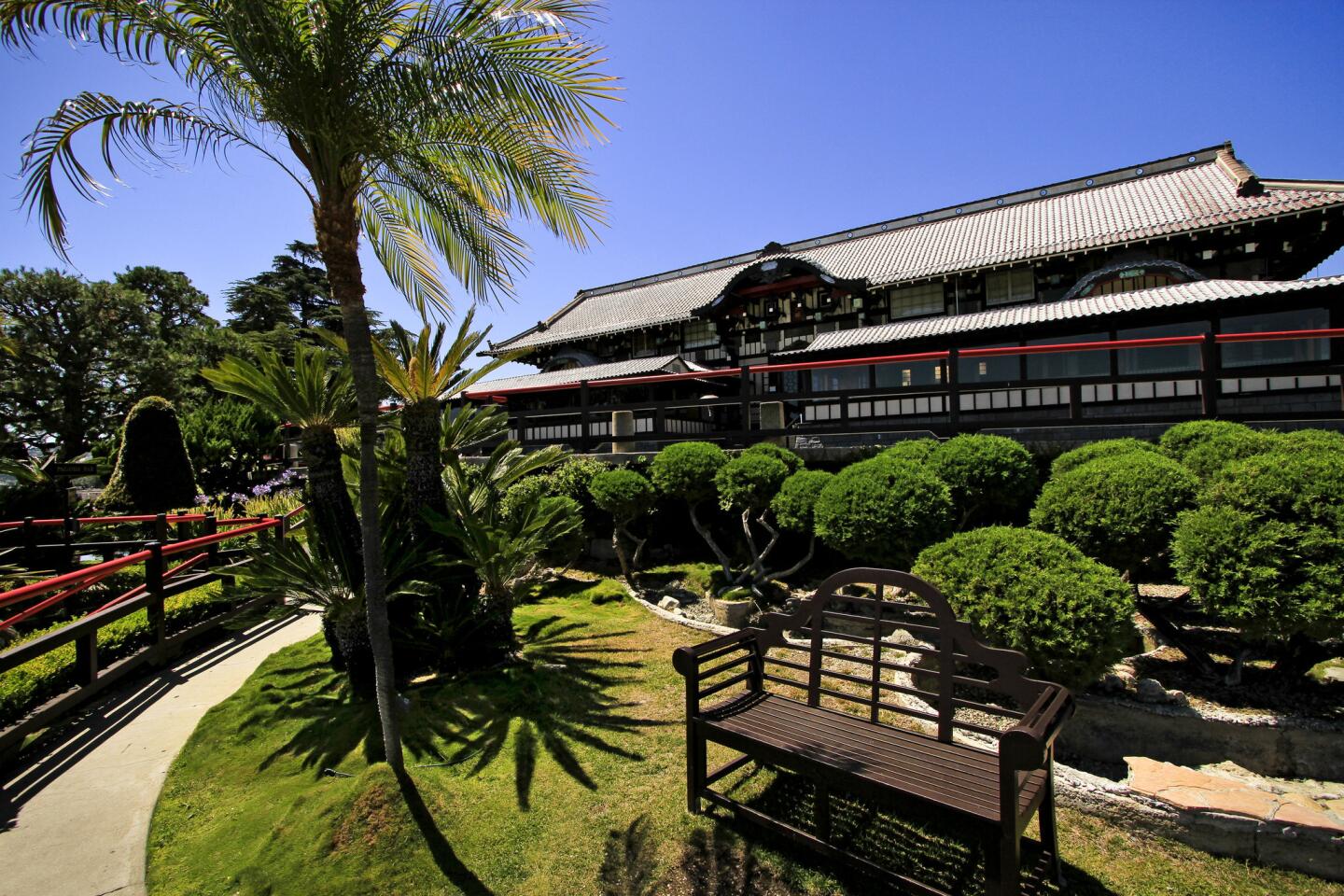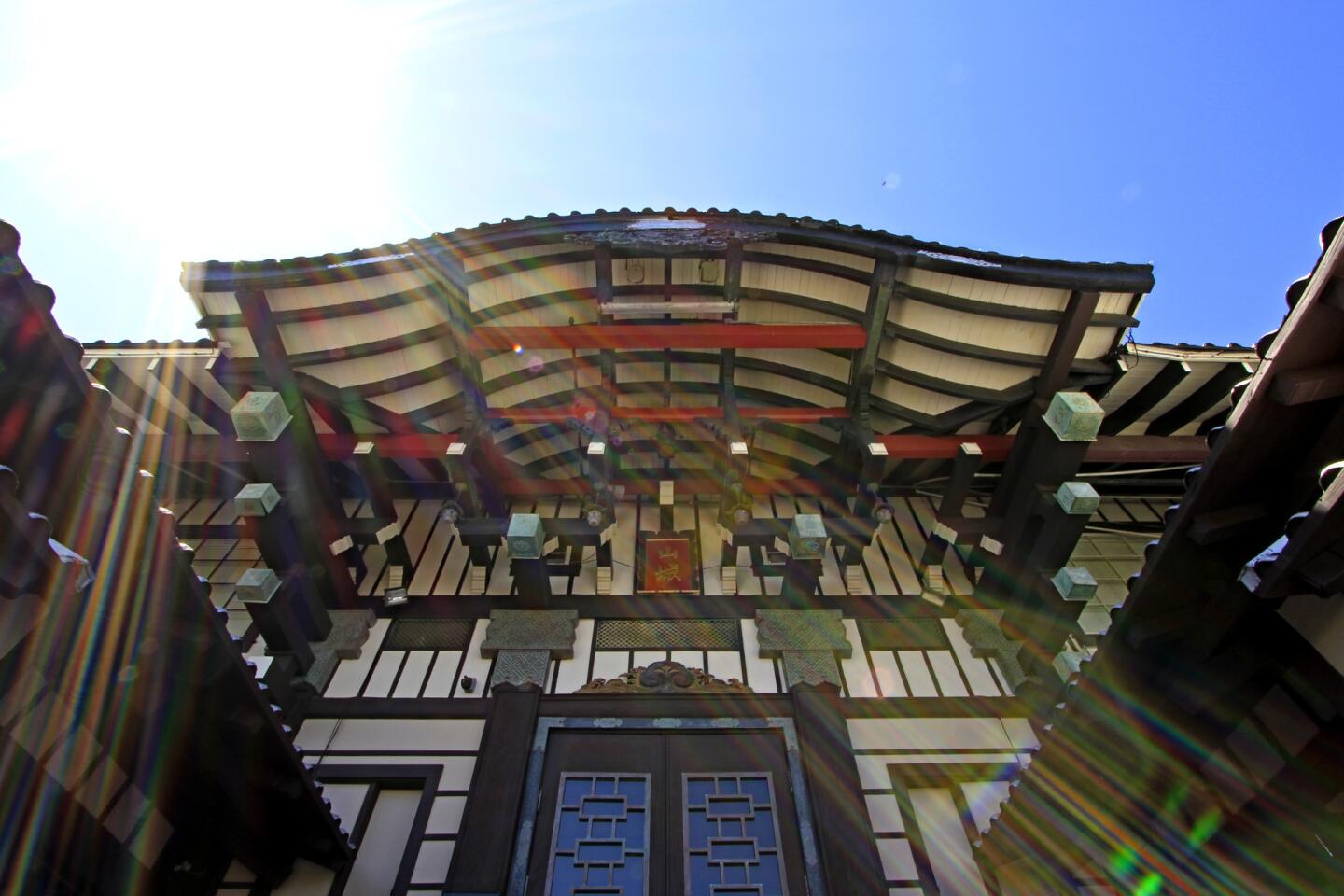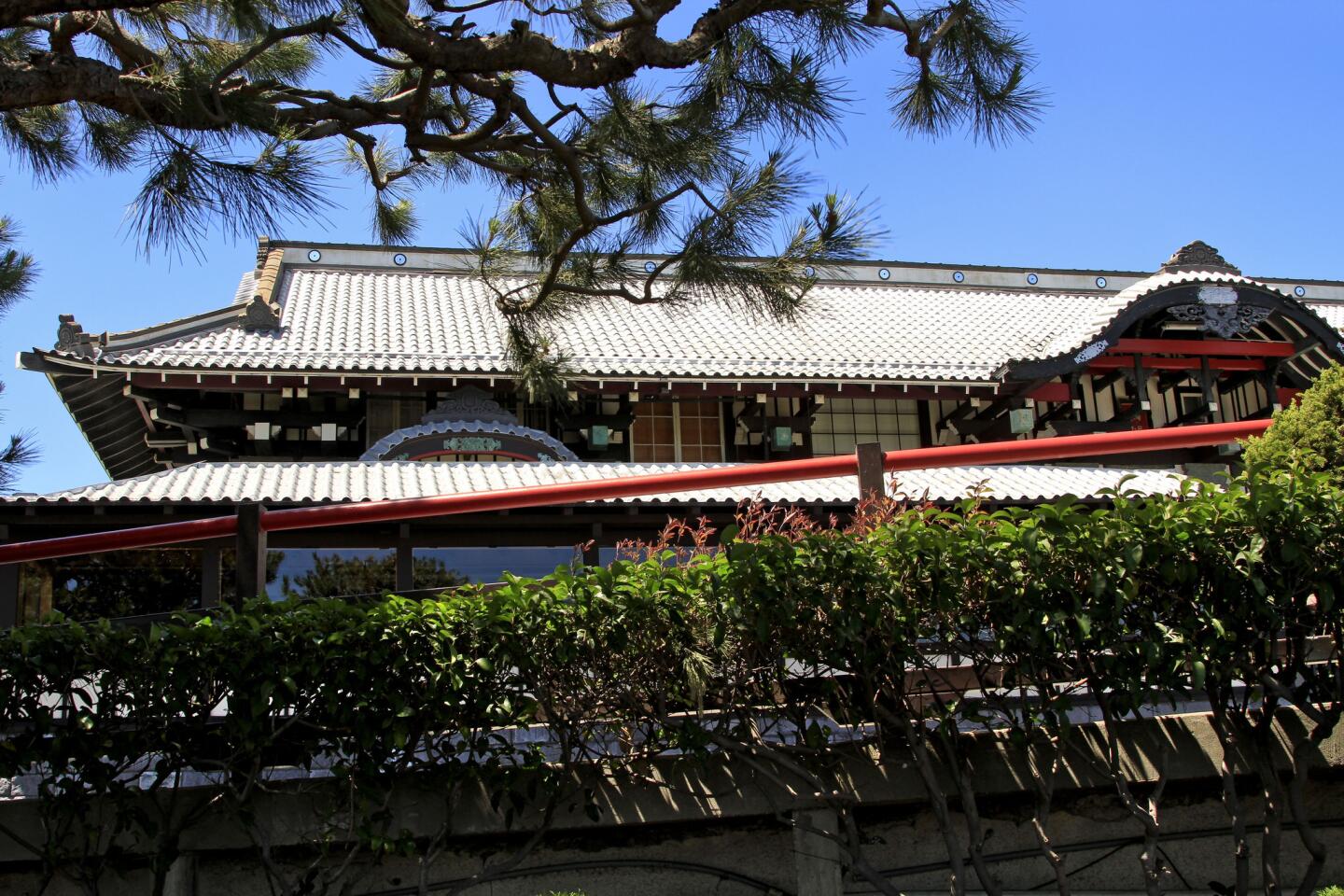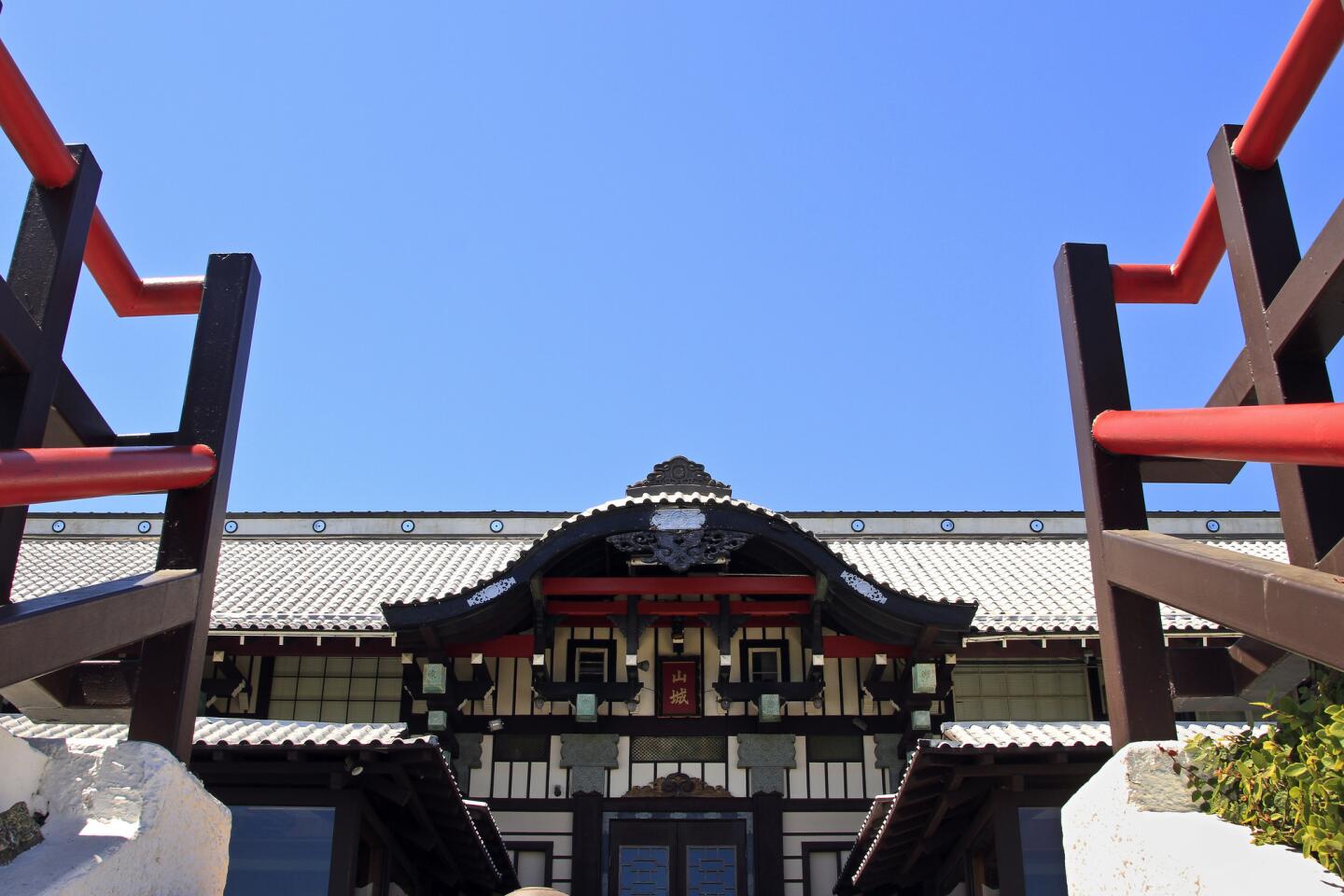Chinese hotel firm buys Yamashiro property in Hollywood Hills
- Share via
A prime hillside plot in the Hollywood Hills featuring the landmark Yamashiro restaurant has been sold to a Beijing company for nearly $40 million, the latest in a wave of Chinese investment sweeping Los Angeles.
The sale represents the first purchase in the United States for JE Group, a hotel operator known for refurbishing historic properties on its home turf.
Kang Jianyi, chairman of JE, said there will be few changes to the site, except for sprucing up the aging buildings, including a small hotel, apartments and the restaurant building, a replica of a palace near Kyoto, Japan.
“Los Angeles is a fashionable city,” said Kang, who was in Pasadena and spoke through a translator Tuesday. “The entire world knows Hollywood.”
The seven-acre property was marketed by brokerage Colliers International as a development opportunity, but Kang said new construction would not be appropriate. Instead, he vowed to keep open both the restaurant and the Hollywood Hills Hotel and Apartments, which has a mix of 43 units.
Kang added that his company is in negotiations with the current operators of Yamashiro — a restaurant popular with tourists and as a place to celebrate special events — and that it was possible there would be a new restaurant operator.
Kang said some Chinese investors are part of the deal that closed Monday, though he declined to name them.
JE’s purchase is just the latest marquee acquisition for a Chinese company in the United States, seen as a haven for diversifying holdings as China’s economy slows.
On Monday, Anbang Insurance Group Co., a Chinese insurer, made an unsolicited $12.8-billion offer for Starwood Hotels & Resorts Worldwide Inc., which owns the Westin and Sheraton brands.
The offer came only days after Anbang reportedly agreed to buy Strategic Hotels & Resorts Inc., whose posh properties include the Hotel del Coronado near San Diego and the Loews Santa Monica Beach Hotel.
Now JE wants in on the action. The firm has seven hotels in China, and Kang said he hopes to expand beyond Los Angeles to other major cities, such as Seattle, San Francisco and Miami.
The Yamashiro property, which drew interest from other international buyers, has been up for sale before.
In 2007, more than 10 descendants of Thomas O. Glover, who bought the property for $150,000 in 1948, agreed to put it on the market, along with the nearby Magic Castle, a private club for magicians they also owned.
The property was seen as a development opportunity at that time — perhaps for a larger hotel — but local residents were concerned that any construction would spoil the neighborhood’s ambience and worsen traffic. A sale was never consummated and the financial crisis hit.
Now, the descendants decided to sell only the Yamashiro site, which also includes a vacant home, an administrative building and a 600-year old pagoda imported from Japan.
John Tronson, a principal with commercial real estate brokerage Avison Young, said the nearly $40-million price tag seemed a bit high if JE didn’t build something else, such as more residences or another hotel. But he noted the hillside property is difficult to develop, given slopes, its historic designation and likely strong opposition from neighbors.
“It’s a really challenging site,” said Tronson, who was not involved with the sale.
Kang’s plans not to develop the site could help to assuage concerns over the change of ownership.
Colliers International’s marketing brochure cites the land’s “untapped development potential,” noting zoning would allow 382 residential units. But it also states the historic restaurant building, gardens and other structures would need to be taken into consideration.
The sale comes amid a backlash over development in Hollywood. Local activists are pushing a ballot measure to crack down on what they see as the “Manhattanization” of Los Angeles.
In downtown Los Angeles, skyline-altering projects underway from Chinese developers include Greenland Group’s $1-billion Metropolis hotel and condo development, as well as Oceanwide Real Estate Group’s massive hotel, retail and residential project a few blocks away.
Cranes dot the Hollywood skyline and recent projects include Kilroy Realty Corp.’s Columbia Square, a $420-million office, residential and retail complex that finished construction in January.
More is probably on the way. Developer Crescent Heights, for example, hopes to break ground early next year on two 30-story residential towers known as the Palladium Residences.
“There is a lot of capital and a lot of investor interest in this incredible, dynamic area,” said Stephen Algermissen, a Colliers International executive vice president who represented the sellers in the Yamashiro deal. “There are a lot of businesses going there. There are a lot of people that want to live there.”
Kitty Wallace, a Colliers executive vice president who also represented the sellers, said Hollywood’s boom attracted interest from buyers all over the world.
They included a group from Italy that wanted to turn the Yamashiro property into a private club and fashion runway, as well as a principal of a northern California tech company who hoped to base a think tank there.
“It’s arguably one of the best sites west of the Mississippi,” Wallace said.
Finished in 1914 by the Bernheimer brothers, the Yamashiro building — with its garden courtyard and koi ponds — is part of Hollywood lore.
Millionaire silk importer Adolph Bernheimer and his brother Eugene lived at the mansion for a time and charged Angelenos 25 cents each to see their Asian art collection they kept on site.
By the 1920s, the mansion had transformed into an exclusive social club for the Hollywood elite, including actors Lillian Gish and Ramon Navarro. During World War II, it was mistakenly rumored to be a signal tower for the Japanese and was vandalized.
It became a restaurant, with sweeping views of the city, in the 1960s.
Kang vowed to maintain and “respect” the architecture of the historic buildings during the renovation process.
“We are a very culturally sensitive restaurant and hotel chain,” he said.
That sounded good to Adrian Scott Fine, director of advocacy at the Los Angeles Conservancy, who was concerned over what might happen to the site in development-happy Hollywood.
“If it’s in safe hands with a new buyer that understands and appreciates it, that is fantastic news,” he said.
Staff writer Julie Makinen and researchers Nicole Liu and Yingzhi Yang in The Times’ Beijing bureau contributed to this report.
Twitter: @khouriandrew
MORE FROM BUSINESS
Lower gas prices drag down retail sales in February
End of an era: CBS to sell its historic radio division
Tribune Publishing’s bid for O.C. Register faces antitrust hurdles, DOJ says
More to Read
Inside the business of entertainment
The Wide Shot brings you news, analysis and insights on everything from streaming wars to production — and what it all means for the future.
You may occasionally receive promotional content from the Los Angeles Times.














